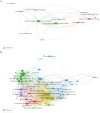Global research trends on psychological well‑being of children in foster care homes from 2003 to 2023: a bibliometric analysis using Scopus database
- PMID: 39282678
- PMCID: PMC11393781
- DOI: 10.3389/fpsyg.2024.1397624
Global research trends on psychological well‑being of children in foster care homes from 2003 to 2023: a bibliometric analysis using Scopus database
Abstract
Purpose: The study focuses on contemporary trends in the psychological well‑being of foster children residing in care homes over the past two decades. Moreover, it aims to predict future research directions by analyzing hotspots, offering valuable references for academics engaged in further studies in this field.
Methods: A quantitative analysis was conducted on nine hundred and twelve documents, including research papers and reviews, from 2003 to 2023. These publications focused on the psychological well‑being of foster children and were incorporated from the Scopus database. For visual analysis, we utilized the bibliometric analytical tool VOSviewer to generate a map of information on the authors, journals, organizations, nations, citations, and keywords. We also employed Microsoft Excel tables to record the essential details.
Results: The psychological well‑being of children and adolescents residing in foster homes is an emerging area of research. The findings show that there has been an ongoing rise in relevant research publications over time. The United States (416) and Harvard Medical School (56) were the most active countries and organizations in this study. AIDS Care: Psychological and Socio-Medical Aspects of AIDS/HIV (91 articles) and Vulnerable Children and Youth Studies (86 articles) are two prominent journals, while the Journal of Child Psychology and Psychiatry had the most co-citations (630). Nelson (52 publications) and Zeanah (50 publications) are the top two leading authors based on citation counts. Institutional care, orphans, HIV/AIDS orphans, psychological well‑being, and mental health, resilience are popular research keywords in this study.
Conclusion: This study indicates the prevailing interest in the specified domains over the past two decades. Our findings primarily indicate that addressing mental health concerns, along with understanding the needs of children in foster care homes, can enhance their psychological well‑being. Developing effective interventions to enhance the psychological well‑being of children in foster care is bound to have a profound effect on them and will serve as a key focus for future research in this field.
Keywords: Scopus database; VOSviewer; bibliometric analysis; foster care homes; orphans; psychological well‑being.
Copyright © 2024 Priyadarshini D and Jose.
Conflict of interest statement
The authors declare that the research was conducted in the absence of any commercial or financial relationships that could be construed as a potential conflict of interest.
Figures








References
-
- Bhargava A. (2005). AIDS epidemic and the psychological well-being and school participation of Ethiopian orphans. Psychol. Health Med. 10, 263–275. doi: 10.1080/13548500412331334181 - DOI
Publication types
LinkOut - more resources
Full Text Sources
Miscellaneous

